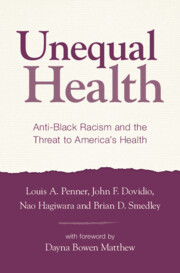Book contents
- Unequal Health
- Unequal Health
- Copyright page
- Dedication
- Endorsements
- Contents
- Figures
- Tables
- Foreword
- Prologue
- Acknowledgments
- Introduction
- Chapter 1 The Past Is Prologue
- Chapter 2 A Threat to the Common Good
- Chapter 3 “Two Americas”
- Chapter 4 Racism in American Medicine
- Chapter 5 Not Part of the Solution
- Chapter 6 A Dangerous Foot in the Door
- Chapter 7 Paths to a Solution
- Index
- References
Chapter 4 - Racism in American Medicine
Do No Harm to Some; Do Great Harm to Others
Published online by Cambridge University Press: 07 September 2023
- Unequal Health
- Unequal Health
- Copyright page
- Dedication
- Endorsements
- Contents
- Figures
- Tables
- Foreword
- Prologue
- Acknowledgments
- Introduction
- Chapter 1 The Past Is Prologue
- Chapter 2 A Threat to the Common Good
- Chapter 3 “Two Americas”
- Chapter 4 Racism in American Medicine
- Chapter 5 Not Part of the Solution
- Chapter 6 A Dangerous Foot in the Door
- Chapter 7 Paths to a Solution
- Index
- References
Summary
This chapter concerns the history of anti-Black racism in American medicine. For a very long time, medical professionals either refused to treat Black patients or required they be treated in segregated, dramatically under-resourced settings. This was due to both racist laws and social customs that produced systemic racism within the medical establishment. Major medical professional organizations both actively and passively supported segregated healthcare. Black people were also largely excluded from professional schools and greatly restricted in their ability to practice medicine. Further, Black people were often abused and exploited by unethical medical practices, which included robbing their graves to provide cadavers and forcing them to participate in dangerous and unethical medical experiments. Black Americans were further harmed by physicians’ involvement in the eugenics movement. Based on gross misunderstandings of genetics and heredity, eugenics proposed that society could be improved by limiting reproduction among socially disadvantaged groups. This resulted in involuntary sterilizations that disproportionally targeted Black Americans. Most racist medical policies and practices were eliminated by legislation and changes in professional and societal norms. However, the legacy of racism in American medicine can still be seen in current healthcare practices that harm Black patients and greater medical mistrust among Black Americans.
Keywords
- Type
- Chapter
- Information
- Unequal HealthAnti-Black Racism and the Threat to America's Health, pp. 167 - 204Publisher: Cambridge University PressPrint publication year: 2023



